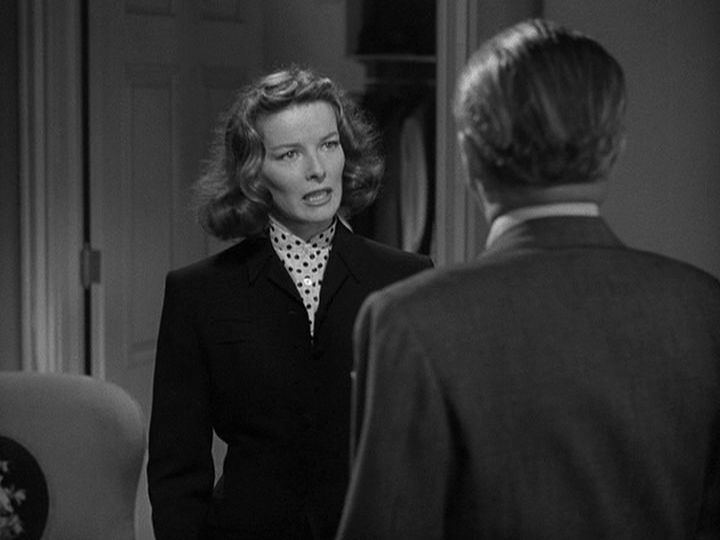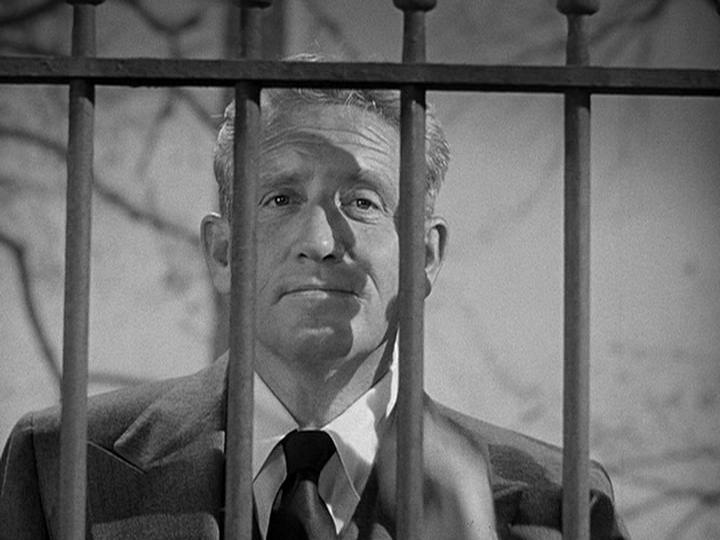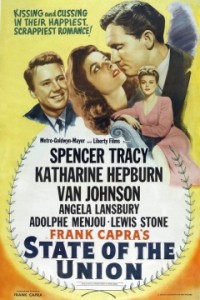|
Genres, Themes, Actors, and Directors:
- Adolph Menjou Films
- Angela Lansbury Films
- Frank Capra Films
- Katharine Hepburn Films
- Marital Problems
- Play Adaptation
- Political Corruption
- Spencer Tracy Films
- Van Johnson Films
Review:
Frank Capra’s stagy adaptation of Howard Lindsay and Russel Crouse’s Pulitzer Prize-winning play (loosely based upon a notorious affair between Republican nominee Wendell Willkie and newspaper editor Irita Van Doren) isn’t nearly as well-known or beloved as Capra’s two most famous political dramas, Mr. Smith Goes to Washington (1939) and Meet John Doe (1941) — perhaps due to a number of real-life political references which situate it a bit too firmly within its specific era. The film also suffers from both an uneven tone and an overly simplistic storyline: while it’s no surprise that a powerful man like Tracy’s aviation industrialist might be estranged from his wife and carrying on an affair with a much younger woman, Hepburn is simply too radiant, smart, and loyal for us to understand (without additional context) why nice-guy Tracy would stray from her. Sure, men are lured away from amazing women all the time — but despite Lansbury’s youth, she simply can’t hold a candle to Hepburn, either in appearance or personality. Indeed, as written (and acted), Lansbury’s “Kay Thorndyke” (what a name!) is a decidedly one-dimensional villainess (complete with a “Cruella De Vil” streak in her frosted hair), and ultimately comes across as little more than the personification of female power run amok.
Despite these serious caveats, however, the bulk of the storyline remains as relevant as ever in its exposé of the corrupt machinations behind any presidential campaign; and there’s plenty of smart dialogue sprinkled throughout to enjoy:
“No woman could ever run for President. She’d have to admit she’s over 35.”
“You politicians have stayed professionals only because the voters have remained amateurs.”
Indeed, one can’t help getting caught up in the story, and typically fine lead performances by Hepburn and Tracy add to its appeal. However, this one is only must-see for Hepburn-Tracy and/or Capra completists.
Redeeming Qualities and Moments:
- Katharine Hepburn as Mary Matthews

- Spencer Tracy as Grant Matthews

Must See?
No, though it’s worth a one-time look.
Links:
|



One thought on “State of the Union (1948)”
Must-see – and among Capra’s best films.
I did see this film a long time ago but, as stated, it is (alas) not a Capra film that has received enough attention; not nearly the attention it deserves. As a result, it fell off my radar as one I should have watched again long before now.
Not only does it stand out to me as one of the director’s best films – but it seems to me that I should rank it as my favorite Tracy-Hepburn vehicle after ‘Pat and Mike’. The two stars are just beyond marvelous here. (In fact, the whole cast is good and has solid ensemble chemistry.)
As adapted by Anthony Veiller (a very capable writer) and Myles Connolly, the story is a veritable hotbed of activity and explosive/snappy language (chock-full of memorable and very quotable lines); you will need to be wide-awake and concentrating on all cylinders…but you won’t mind a bit, especially if you have an interest in how Washington works (which you really should). Apparently not all that much has changed in politics from then til now (except for the occasional reprieve).
I guess that means I don’t find the film either uneven or simplistic. I find it rather gripping from beginning to end – and, when it zooms in on the specifics of how politicians manipulate everyone around them, it pretty much grabs me by the throat.
It’s absolutely true that Hepburn’s character is “radiant, smart and loyal” but, it seems to me, that is exactly why Tracy allows himself to fall under Lansbury’s dubious charms (which are really not all that charming, just brutally business-like – which, to Tracy, may be the bizarre source of the ‘charm’). I would say that Tracy could very easily be viewed as one who is punishing himself with Lansbury – for not being able to meet Hepburn on her level and thrive with her there. (It’s only when Hepburn uncharacteristically caves at the story’s climax that Tracy sees what an utter and complete fool he has often been. He seems to be the type of man who may be large with confidence when it comes to a career but rather an insecure dunce when it comes to his own personal heart.)
[By the way, watching Lansbury here, one can clearly see the seeds of her chilly performance that is to come in ‘The Manchurian Candidate’.]
A real surprise comes late in the film – when Hepburn gets drunk at the worst possible time. (In this sequence, the actress gives us a reverb of her daffiness in ‘Bringing Up Baby’, and it’s actually quite suddenly pleasant as well as an interesting character arc at that point in the story.)
This film is as entertaining as it is educational – and all would do well to see it, if only as an exercise in the responsibilities of being an American.
It’s also some of Capra’s breeziest direction; this thing flies like crazy.
I’m certainly glad I saw this film again. It lifted me up and I found it inspiring.